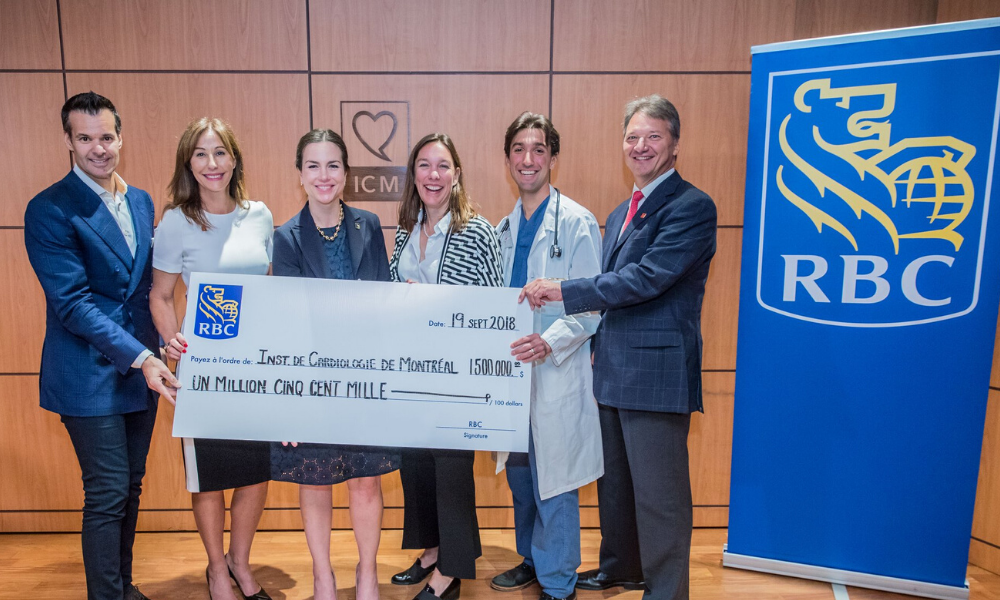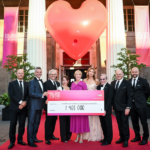RBC Royal Bank donated $1.5 million to the Montreal Heart Institute Foundation for the creation of a Simulation-Based Education Program
Home > Press room > RBC Royal Bank donated $1.5 million to the Montreal Heart Institute Foundation for the creation of a Simulation-Based Education ProgramSeptember 19, 2018
─
As part of Healthcare Simulation Week, the Montreal Heart Institute Foundation announced the creation of the only Simulation-Based Education Program in the country completely dedicated to cardiology. Canada’s first program of its kind at the Montreal Heart Institute (MHI) is made possible thanks to a $1.5 million donation from RBC Royal Bank.
Assisted by a team of simulation experts, Dr. Nicolas Thibodeau-Jarry, cardiologist and medical education specialist, will lead this new innovative program that will have a major impact on the optimization of training for professionals and care for patients. New positions will be created to develop and implement the Simulation-Based Education Program, which will be established, as of this month, at the Montreal Heart Institute and overseen by the MHI’s education department.
A significant impact on patients
Simulation has proven to be an efficient education tool in medicine over the last few years. In fact, studies show the tangible benefits of this method compared to a traditional education curriculum. Every year, the country’s first Simulation-Based Education Program will provide more than 150 participants with 10 simulation curriculums on a variety of medical topics. The creation of this new program confirms the Montreal Heart Institute’s commitment to putting the patients at the heart of its approach and providing them with the best care possible.
In addition to fostering knowledge sharing and long-lasting relationships between physicians and patients, the Simulation-Based Education Program will have numerous positive effects on both the medical staff and patients. Benefits will include greater rigour and uniformity in education and medical practices; the improvement of the quality, the efficacy and the performance of medical teams; quicker analysis from professionals in emergency situations; more secure and optimal interventions; and the prevention of medical errors and complications. First offered to professionals and trainees at the Montreal Heart Institute, the program will also be available to health care professionals in Quebec, Canada and abroad. This will undoubtedly showcase the unparalled level of expertise available at the Montreal Heart Institute.
The Institute also aims to implement a simulation-based curriculum for high school and CÉGEP students across Quebec to allow them to use the notions they have learned about anatomy and physiology and apply them to virtual patients. This approach will also help students gain a hands-on, enriching experience that puts them in contact with renowned health care professionals in the hopes of getting them interested in a career in health sciences.
“With the implementation of this innovative program, the eyes of the national and international community will be on us. In addition to emphasizing our willingness to attract and retain the best talent in cardiology in Quebec, this program will also allow the Montreal Heart Institute to confirm its position as a world leader in cardiovascular health,” said Lino A. Saputo, Jr., Chair of the Board of Directors of the Foundation.
“RBC Royal Bank’s very generous contribution to the Investing in Excellence project will have an immense impact on the care provided to patients. The future of cardiology depends on cutting-edge education and training. Investing in education is tantamount to investing in our resources and the excellence of cardiovascular medicine,” said Josée Noiseux, CEO of the Foundation.
“I am thrilled at the idea of leading the Simulation-Based Education Program. My professional background and specialized training in medical pedagogy at the Harvard Medical School have allowed me to gain a leading expertise that I am proud to share and practice here, in Quebec,” said Dr. Nicolas Thibodeau-Jarry, cardiologist and medical education specialist.
“We were impressed by this innovative project that will have a huge impact on our community. Young physicians and other health care professionals will benefit from even better training and will be able to provide exceptional care in Quebec,” said Nadine Renaud-Tinker, President, Quebec Headquarters, RBC Royal Bank.
About RBC Royal Bank
Royal Bank of Canada is a global financial institution with a purpose-driven, principles-led approach to delivering leading performance. Our success comes from the 84,000+ employees who bring our vision, values and strategy to life so we can help our clients thrive and communities prosper. As Canada’s biggest bank, and one of the largest in the world based on market capitalization, we have a diversified business model with a focus on innovation and providing exceptional experiences to our 16 million clients in Canada, the U.S. and 34 other countries.
We are proud to support a broad range of community initiatives through donations, community investments and employee volunteer activities. See how at rbc.com/community-sustainability.
About the Montreal Heart Institute
Founded in 1954 by Dr. Paul David, the Montreal Heart Institute constantly aims for the highest standards of excellence in cardiology through its leadership in clinical and basic research, ultra-specialized care, professional training and prevention. It is affiliated with the Université de Montréal.
About the Montreal Heart Institute Foundation
Founded in 1977, the Montreal Heart Institute Foundation’s mission is to raise and administer funds to support the Institute’s priority and innovative projects. These funds help the Institute maintain its leadership position in the fight against cardiovascular disease, the number-one cause of death worldwide and the leading cause of death for women in Canada. Since its creation, the Foundation has raised nearly $260 million in donations. These generous contributions have allowed the Institute to become the country’s largest cardiology research centre. It now also includes Canada’s first Prevention Division, a cardiovascular genetic centre, as well as the only Simulation-Based Education Program in the country. Canada’s first heart transplant was performed at the Institute in 1968, just like the world’s first cryoablation of arrhythmia in 1999.

From left to right: Lino A. Saputo, Jr., Josée Noiseux, Nadine Renaud-Tinker, Mélanie La Couture, Dr. Nicolas Thibodeau-Jarry, Dr. Serge Doucet



